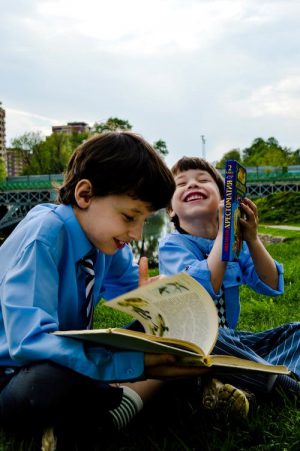
September 9, 2019, by Rupert Knight
Building communities of engaged readers: an exciting opportunity for local primary teachers
In this post Helen Victoria Smith explores the idea of ‘reading for pleasure’ and how research-informed practice can build communities of engaged readers. She draws on research carried out by the Open University (OU) and United Kingdom Literacy Association (UKLA) to discuss the importance of developing ‘Reading Teachers’, and offers the opportunity for local primary teachers to join a new Teachers’ Reading Group at the University. This post builds on previous ones in this series on whole class reading, picture books and high quality children’s literature.
Reading for pleasure
Reading for pleasure refers to reading that we do of our own free will anticipating the satisfaction that we will get from the act of reading. It also refers to reading that having begun at someone else’s request we continue because we are interested in it. It typically involves materials that reflect our own choice, at a time and place that suits us. (Clark & Rumbold, 2006, p.5-6)
Reading for pleasure has become a concern for many primary professionals over recent years. Not least because government-imposed testing regimes and curricula have reduced reading to a set of measurable skills based around decoding and comprehension. Yet the National Curriculum in England also demands that children develop pleasure in reading and motivation to read. Primary teachers therefore have to find ways to ensure their children develop the skills they need to achieve expected reading attainment levels, whilst also encouraging them to read ‘for pleasure’.
However, research such as that explored by the National Literacy Trust (NLT), suggests that while there has been an improvement in children’s reading skills in the UK in recent years, this has been accompanied by a decline in some children’s enjoyment of reading. The NLT’s latest survey on children’s reading confirms this, with children’s reading engagement in the UK steadily falling since 2013. This is of particular concern as the Organisation for Economic Cooperation and Development’s (OECD) data shows that reading for enjoyment is related to reading proficiency, and the NLT (see above) state that children who enjoy reading are five times more likely to read above the level expected for their age than their peers who do not enjoy reading. Other research has shown wider benefits of reading for pleasure. For example, improved general knowledge, greater self-confidence as a reader, a richer vocabulary and increased spelling accuracy, experience of different styles of writing, a better understanding of the world and other cultures, and the development of imagination and empathy for others (see Cremin et al, 2014, pages 9-11, and Clark & Rumbold, 2006).
How can teachers help children to read for pleasure?
The ‘Teachers as Readers: Building Communities of Readers’ project carried out by the Open University (OU) and United Kingdom Literacy Association (UKLA) between 2006 and 2008, examined children’s and teachers’ reading lives and practices. A key finding was that teachers struggled to keep up-to-date with the range of children’s literature available and relied on a limited range of authors.

The researchers argued that teachers need to have a broad knowledge of appropriate books, authors and poets, as well as an understanding of how and when to use them, if they are to motivate and engage young readers. They therefore “sought to widen teachers’ knowledge and use of children’s literature, and to associate reading with positive, interesting and satisfying experiences for both children and teachers.” (Cremin et al., 2014, p. 19).
The project included time for the teachers involved (80% of whom were not literacy subject leaders) to meet together to read and talk about children’s literature. The research team, librarians and the project’s children’s literature expert shared books and pedagogical approaches, and the teachers soon began to make recommendations to each other. As a result, reading communities were established, and the teachers reported a significant increase in their knowledge of children’s literature, as well as in their confidence and pleasure in reading a wider range of texts. Their new-found enthusiasm for reading was passed on to their pupils, with recommendations and discussions frequently happening between children and their teachers. These ‘Reading Teachers’ (teachers who read and readers who teach) were able to develop reciprocal communities of engaged readers – readers who can, and do, choose to read for pleasure. Their pupils’ attainment showed considerable improvement as they became more proficient at describing and sharing their knowledge and experience of authors, poets and illustrators. They took pleasure in talking about their reading with others, and in making choices about what, when and how they read.
Becoming a Reading Teacher
If you are interested in learning more about this project, you can visit the Open University’s Research Rich Pedagogies website. As well as providing more information about the 25 schools involved in the project and the approaches that were developed, the website represents another community of engaged readers – innovative examples of practice are shared, and a monthly newsletter provides regular updates and resources such as powerpoints and videos.
If you would like to get more involved, we are excited to announce that Helen Smith and Sally Betteridge (Assistant Professors in the School of Education) are now recruiting for a new OU/UKLA Teachers’ Reading Group, to begin at the University of Nottingham on 1st October 2019. We are joining over 80 groups that already run across the UK and beyond (groups can be found here).
Groups seek to:
1. Foster children’s reading for pleasure through supporting teachers’ own reading for pleasure and research-informed practice.
2. Support the profession by building a professional community around reading for pleasure locally and online.
3. Share teachers’ resultant development work on the OU Reading for Pleasure website.
We will meet 6 times over the year (from 4.30pm to 6.30pm). There is no cost involved.
If you would like to join us, we would love to hear from you.
Please contact either:
Helen Smith (Helen.Smith5@nottingham.ac.uk) or,
Sally Betteridge (Sally.Betteridge@nottingham.ac.uk)
Reference
Cremin, T., Mottram, M., Collins, F. M., Powell, S. and Safford, K. (2014) Building Communities of Engaged Readers: Reading for Pleasure. London: Routledge

Thanks for sharing this amazing post.
Really informative blog about how important it is for teachers to foster a love of reading in children outside of the classroom and how this should have a lasting effect on their reading skills within the classroom.
I enjoyed this blog. It’s important that children read and I agree that we should Foster that as teachers. I look forward to reading more around this project as it is something that all teachers should be encouraged to do more of.
Reading is such an important part of my life and I cannot imagine a childhood without it. An enthusiasm for storytelling and reading has been a key to bringing my children into the wonderful world ? f books.